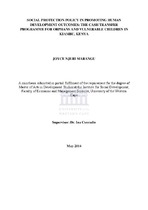| dc.description.abstract | Cash transfers, integral in social protection, have increasingly been viewed as a viable measure of promoting human development outcomes in low and middle income countries in the face of persistent poverty exacerbated by the HIV/AIDS pandemic. Sub-Saharan Africa has been the worst hit by the HIV/AIDS pandemic with almost two thirds of the world’s HIV/AIDS patients living in the region. By 2005, 12 million children were orphaned by the disease while 2 million more below 15 years of age were estimated to be infected (UNICEF, 2005:2). To address the plight of orphans and vulnerable children in Kenya the government together with various international development agencies launched the Cash Transfer Programme for Orphans and Vulnerable Children (CT-OVC) in 2004 to provide for the basic needs of OVC and promote their human development. With the capability approach as its theoretical framework, this research seeks to determine the value attached by recipients of the CT-OVC to capabilities in the four broad dimensions of social life, health, education and play. It also seeks to gauge the extent of attainment of functionings in the four dimensions, and the association between participation in the programme and one’s functionings in the key dimensions. The research is conducted through a quasi-experimental design which compares recipients of the cash transfer to non-recipients and mixed methods are used to collect and analyse data. Results show that OVC consider capabilities in the dimensions of social life, education, health and play to be of high value in their lives. Children in the recipient group appear to have attained functionings in the four dimensions to a higher degree than their counterparts in the comparison group. There is also an association between participation in the CT-OVC programme and attainment of functionings in all four dimensions. Perceptions from participants explore further opportunities created or expanded through the CT-OVC as well as participants’ suggestions on the programme | en_US |

